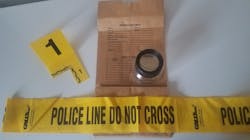Eye for Evidence: The Importance of Proper Evidentiary Training
Just as in any job, policing requires extensive training. This enables personnel to properly do their job in a knowledgable way. All aspects of policing are crucial. There is no part or any type of personnel that is “less important” than anyone else in a department. All must be there, working together, in order to make each incident and each case work well.
One aspect of investigation that often falls through the cracks is evidence. You either love it or you don’t. However, whether you like it or not, evidence plays a key role in all cases and you must have the proper training in order to successfully use evidence to build your case.
Evidentiary training comes in various levels but the most important ones to have are how to properly collect and package evidence and how to document it. If those are the only two evidentiary trainings you ever have, that is enough. These two components can literally make or break a case. It may not be of interest to everyone in your department, but I do believe everyone should have a good, solid basis and a proper evidentiary training. It will pay off later if you take a little more time properly document and collect evidence.

Hilary Rodela
Hilary Rodela is currently a Surveillance Officer, a former Private Investigator, a former Crime Scene Investigator, and Evidence Technician. She worked for the Ruidoso (NM) Police Department as well as the Lubbock (TX) Police Department. She has written for several public safety publications and has extensive law enforcement and forensic training and is pursuing forensic expertise in various disciplines. Hilary is a freelance public safety writer and curriculum developer for the National Investigative Training Academy.



